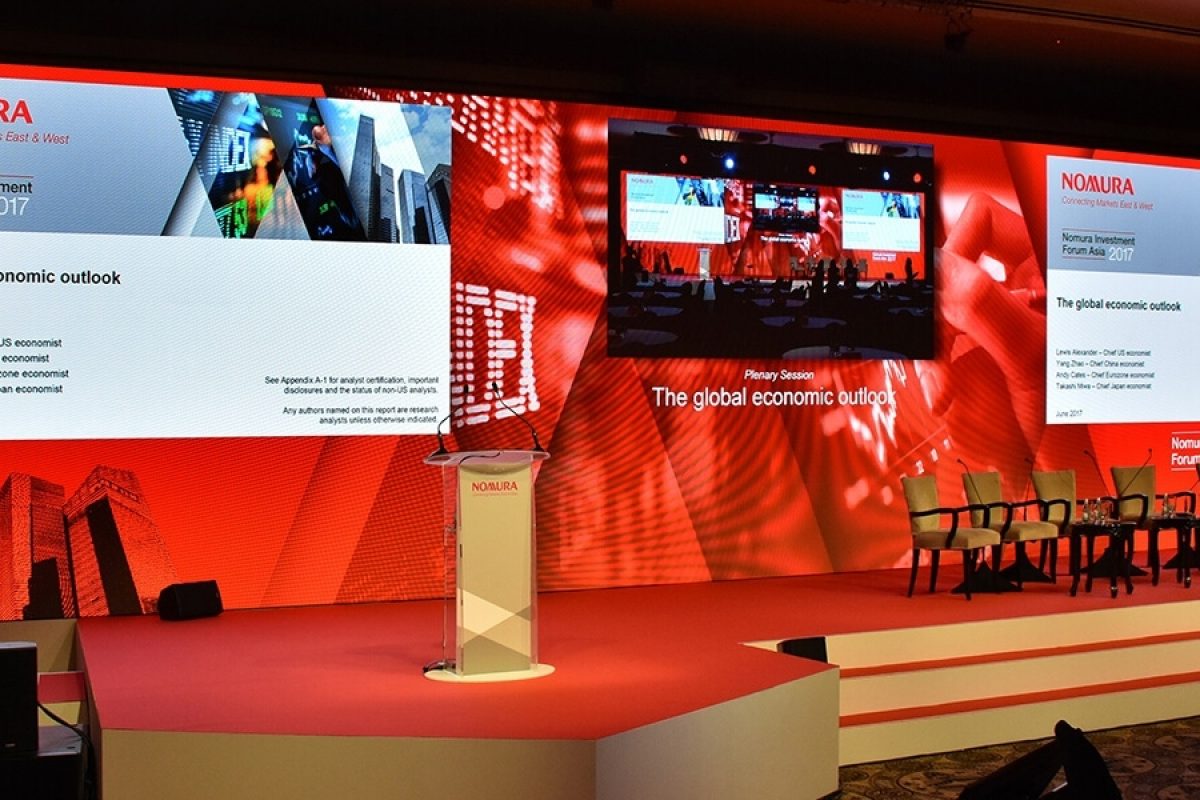
Highlights from Nomura Investment Forum Asia 2017
We held our 14th annual Nomura Investment Forum Asia (NIFA) from June 6 to 9, 2017 in Singapore. Hear from some of our key speakers in this video with highlights from the conference.
Introduction
This is the 14th edition that we’ve had of NIFA in Singapore. We’ve got a lot of clients here – 1,000 investors, 50 corporates from Japan, 100 corporates from Asia, a lot of meetings. Probably the biggest NIFA conference we’ve had in the past. But the one difference I would say this time, to previous times, is the focus on Global Markets. This is no longer just a corporate access event, this is a full Global Markets event. So the idea here is we’ll be marketing our other products. credit products, FX products, rates products, structured products, so this is a real showcase I think of Nomura’s capabilities within the region.
Nomura is in a great position. So Nomura, I think as I mentioned in the speech earlier, it’s large enough and focused enough to be Asia’s investment bank. But it is also small enough to be nimble and entrepreneurial. We are an Asia bank, not just a Japan bank, it’s an Asia bank, and so the AEJ region is equally important to us. Selling the Asia product into Global is a unique capability that Nomura has and unique selling point. I also think we are very good at the few businesses that we tend to really focus on, so the rates business, emerging markets business, parts of the equity business, and the credit business. We are top tier, and I think that’s key for us to sell our brand.
Research
Nomura is the number one provider of Research services for the market in Japan. Japan is the biggest part of Asia Pacific, accounting for 40% of the market. Japan is crucially interlinked with other parts of Asia, including China, Korea and ASEAN. We think we can use our strong position in Asia’s leading market as a way of helping investors navigate markets outside of Japan.
View related reports:
- Nomura Investment Forum Asia 2017 - Highlights Day 1 & 2
- Nomura Investment Forum Asia 2017 - Highlights Day 3
China
Fintech really took off in the last couple of years. And I think after the global financial crisis the world is seeking a way to make the financial sector more effective, more productive. China is now number two in terms of funds raised for Fintech. And we found to our pleasant surprise that vis a vis last year where there was a lot of exuberance, people trying to raise as much money as possible for startups. This year startups seem to have found more of a calling which is to raise productivity to some degree for the existing financial industry. Therefore, they are innovative but not as disruptive as once was feared.
In research what we try to do is to find what applies, what doesn’t apply in Asia. And in doing that analysis what we found is that Asian companies have very different capability in articulating their stories. If we say property is about location location, location, equity is about communication, communication, communication. So in NIFA we try to bring together the best of the investable corporates within Asia and have investors communicate two-way and recognize the value and where to invest in the next decades’ engine of growth for the world.
View related article: China FinTech – 2017: from exuberance to execution
View related webcast: Greater China Equity Strategy: Lessons from Japan
Emerging markets
The key thing I’d point out is that it’s not just China. There are so many other countries that are suppliers to China, the parts and the components. If the US does start to do protectionism against China, it will impact Japan, Korea, Singapore, Malaysia. A lot of Asia.
We have our roots in Asia. And why Nomura, because Asia is going to become a much bigger share of the world economy going forward. So if you look ahead, you have to look at Nomura.
View related articles:
- Who would bear the brunt of increased US protectionism?
US
First of all, the US is very dependent upon the rest of the world. Trade has become more important in the US economy over time, so we are actually vulnerable to it as well. That’s one of the things that is sort of ironic about what’s going on. Among the regions outside the US, Asia is I think most dependent upon trade and therefore most vulnerable to an increase in protectionism. Obviously the US China relationship is particularly important. So that’s something that has to be managed. But this region is highly vulnerable to it. I think Europe is less so but it’s important for them as well.
NIFA is a really interesting conference just because of the range of people it draws from this region. This is obviously a very dynamic area. There is a lot of savings and investment going on here. So you get a very rich mix of companies coming to sort of present but also clients that are coming to invest. It’s also a very dynamic region so it’s a very important place for people to sort of learn and exchange ideas.
View related report: Solid global growth but still-low inflation
Japan
Obviously it is crucially important for our Japanese economy to have a more aggressive growth strategy. That is what we call the third arrow of Abenomics. On this point, what I would like to mention is that Japanese government is eagerly struggling to seek a growth opportunity in rapidly growing Asian countries by trying to find an opportunity to get a market of infrastructure investment otherwise technological development, including IOTs, AIs, and other aspects. I think NIFA is a very good opportunity to finance such a trial by the Japanese industries.
View related presentation: Outlook for Japanese Economy
About NIFA
NIFA is very special and it has been successful for 14 years. The reason it’s been successful is we are truly an east meets west firm. We have very good foothold and roots in Japan, but we are able to deliver true capital structure i.e. all multi products. And we think very much holistically around Asia, how corporates work in terms of distribution across various channels of Asia. Imports, exports and we also have true macro overlay.
In the current environment our clients, our investors, face many challenges. Geopolitical risks, technology innovation, regulatory pressures. I think the reason for NIFA’s success is we have addressed all of these in our content delivery. We have guest speakers from the technology world on AI and big data and Fintech. And we address the number of the challenges facing our clients head on.
Contributor

Rig Karkhanis
Head of Global Markets<br/>Asia ex-Japan

Jim McCafferty
Head of Asia ex-Japan Research

Rob Subbaraman
Head of Global Macro Research

Lewis Alexander
Chief US Economist

Takashi Miwa
Chief Japan Economist
Disclaimer
This content has been prepared by Nomura solely for information purposes, and is not an offer to buy or sell or provide (as the case may be) or a solicitation of an offer to buy or sell or enter into any agreement with respect to any security, product, service (including but not limited to investment advisory services) or investment. The opinions expressed in the content do not constitute investment advice and independent advice should be sought where appropriate.The content contains general information only and does not take into account the individual objectives, financial situation or needs of a person. All information, opinions and estimates expressed in the content are current as of the date of publication, are subject to change without notice, and may become outdated over time. To the extent that any materials or investment services on or referred to in the content are construed to be regulated activities under the local laws of any jurisdiction and are made available to persons resident in such jurisdiction, they shall only be made available through appropriately licenced Nomura entities in that jurisdiction or otherwise through Nomura entities that are exempt from applicable licensing and regulatory requirements in that jurisdiction. For more information please go to https://www.nomuraholdings.com/policy/terms.html.


